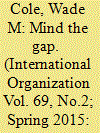| Srl | Item |
| 1 |
ID:
174588


|
|
|
|
|
| Summary/Abstract |
In this paper, I examine two substantive reservations China has made to international human rights treaties, namely China’s reservation to Article 8.1(a) of the International Covenant on Economic, Social and Cultural Rights (ICESCR) and Article 6 of the Convention on the Rights of the Child (CRC), as well as the arguments China adopted to support them in the constructive dialogue between China and the two treaty committees. By positioning China’s reservations and its supporting arguments against the current criteria on making reservations to international human rights treaties, I argue that these two reservations are permissible and the arguments that support them are in general justifiable, all things considered. In conclusion, I reflect on China’s relationship with international human rights treaty bodies through the lens of reservations.
|
|
|
|
|
|
|
|
|
|
|
|
|
|
|
|
| 2 |
ID:
139801


|
|
|
|
|
| Summary/Abstract |
According to recent studies, international human rights treaties are ineffective, counterproductive, or else beneficial for only those countries that tend to respect human rights regardless of treaty membership. Analysts often attribute gaps between human rights principles and practices to willful disobedience, self-interested defection, and ineffective enforcement. Using two-stage regression models to analyze compliance with the International Covenant on Civil and Political Rights, I examine whether countries' inability (as opposed to unwillingness) to implement treaty terms is also responsible for the gap between commitment and compliance. I find that one dimension of state capacity in particular—bureaucratic efficacy—enhances levels of compliance with civil, political, and physical integrity rights provisions. These findings lend credence to an important aspect of the managerial approach—that noncompliance is often inadvertent and conditioned by a state's ability to implement treaty terms.
|
|
|
|
|
|
|
|
|
|
|
|
|
|
|
|